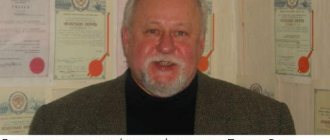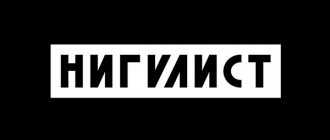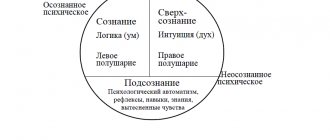"NLP. Techniques in bulk”, Sergey Gorin
A book with a collection of fragments of seminars that were conducted by a specialist in 1993-1995 also made it onto my list. I will say that this book for me became one of the best on NLP, as it very clearly describes how the methods are used.
In this case, on the patients with whom Gorin worked.
But if the level is still beginner, then without basic terminology it can be a little difficult. I recommend that you look at least briefly at Valery Khmelevsky, who in our country has become one of the main authorities in NLP.
NLP - book authors
He spent his childhood in Siberia. In 1972 Graduated from the Faculty of Philology of Leningrad University. He worked as a lumberjack in the taiga, as a commercial hunter in Taimyr, as a cattle herder in the Altai Mountains, as a journalist, as a teacher - in total he changed about thirty professions. The first book of short stories, I Want to Be a Janitor, was published in 1983. and immediately attracted the attention of critics and readers with the accuracy and flexibility of the style and the unexpectedness of the plots. It was followed by Heartbreaker (1988), Story Technology (1989), and Rendezvous with a Celebrity (1990). The bestsellers were the Roman of Education, The Adventures of Major Zvyagin (1991) and the Legends of Nevsky Prospect (I993), which was called by critics the funniest book of recent years. A literary scandal was caused by the mini-novel Nozhik by Serezha Dovlatov. The latest bestseller, the novel The Messenger from Pisa (2000), went through 11 editions in a year. The most published of Russian non-commercial writers today - only in 2000. His books were published 38 times with a total circulation of about 400 thousand copies. He was published in such publications as Literary Gazette, Znamya, October, Friendship of Peoples, Ogonyok, etc. He gave lectures on modern Russian prose at the universities of Milan, Jerusalem, and Copenhagen. In his free time he lives in Moscow, but continues to work in Tallinn.
1950 The family moves to the father’s new duty station in Transbaikalia. Until the age of sixteen, Mikhail changed schools - constantly moving around the garrisons of the Far East and Siberia. Glider pilot courses at the regional DOSAAF.
1964 Move to Belarus.
1965 First publication of poems in a republican newspaper.
1966 Finishes school in the city of Mogilev with a gold medal and enters the department of Russian philology of the Faculty of Philology of Leningrad University. Lives in the family of his grandfather, a 'professor-biologist', head of a department at one of the Leningrad institutes.
1967 - 68 Summer trips to student construction teams in Mangyshlak and near Norilsk.
1969 - In the summer, on a bet with friends, leaving Leningrad without money, in a month I reached Kamchatka as a “hare”, using all types of transport and, by deception, received a pass to enter the “border zone” along the way, which became the legend of the Leningrad Philological Faculty . At the same time, he was a Komsomol course leader and one of the secretaries of the university’s Komsomol bureau.
1970 - Feigns mental illness in a psychiatric clinic to obtain sabbatical leave from the university. In the spring he leaves for Central Asia, where he leads a wandering life in different places for six months. In the fall he moves to Kaliningrad, where he takes an accelerated course as a second-class sailor as an external student and goes on a voyage on a trawler of the fishing fleet.
1971 - Reinstates himself at the university, while simultaneously working as a senior pioneer leader at school. The first 'publication' in Leningrad was a story in the university wall newspaper.
1972 - Graduates from university. Defends a thesis on the topic: 'Types of composition of a modern Russian Soviet story'. The diploma was not accepted for the charge of 'formalist bias'. Repeated defense was scheduled in the Pushkin House /Leningrad Institute of Russian Literature at the USSR Academy of Sciences/. The same diploma is protected. Assigned as a teacher to the Leningrad region. Due to lack of places, she works as a teacher for an extended day group at an elementary school.
1973 - Teacher of Russian language and literature in a rural eight-year school. Dismissed at his own request and at the request of the teaching staff. A concrete worker at the prefabricated structures workshop 4-ZhBK in Leningrad In the summer, he travels with a team of so-called “shabashniks” to the Kola Peninsula, the Tersky coast of the White Sea. Logger and digger.
1974 Junior researcher at the State Museum of the History of Religion and Atheism /Kazan Cathedral/. Scientific topic: 'The emergence of religion and its early forms'. Leads tours of the cathedral. For economic reasons, he was transferred by the director of the museum to joiners, then to a supplier and deputy director for administrative and economic affairs. Dismissed 'due to his own brutality'.
1975 Correspondent of the factory newspaper of the shoe association 'Skorokhod' 'Skorokhodovsky worker', acting. Head of the Culture Department, Acting Head of the Information Department. The first publications of stories in the 'official state press'. Annual newspaper award for the best material on culture. Fired 'due to moral idiosyncrasy'.
1976 From May to October he works as a driver of imported cattle from Mongolia to Biysk along the Altai Mountains. According to mentions in the texts, I remembered this time as the best and coolest time in my life. In the fall, returning to Leningrad, he switches entirely to literary work. The classic version: the first stories are rejected by all editors.
1977 - In May, he goes to the Black Sea on foot and in passing cars. Until October, it wanders along the Black Sea coast from Odessa to Batumi. In the fall he enters a seminar of young Leningrad science fiction writers under the leadership of Boris Strugatsky. For the story "The Button" he received first prize at the North-West science fiction competition. Participates in the Conference of Young Writers of the North-West. The stories were marked and approved, but were not recommended for publication by the conference management /?!/. Doesn't work anywhere. A period of complete beggary.
1978 - First publications in Leningrad city newspapers - short humorous stories. Leto is a timber feller at the Ust-Kulomsky state farm in the Komi Autonomous Soviet Socialist Republic, a foreman of railway construction workers there. Autumn-winter - short-term service in the Soviet Army: senior officer of a ground artillery battery, senior lieutenant.
1979 - Stories continue to be rejected by all magazines and publishers. Prize at the next North-West science fiction competition. Work on lithographic processing of military memoirs at the publishing house 'Lenizdat' and reviews in the magazine 'Neva'. Joining the prose studio at the magazine 'Zvezda' with the intention of facilitating publication. There should be no publications. Autumn - moving to Estonia, to Tallinn, in an attempt to publish a collection of short stories in a local publishing house. Work in the republican newspaper 'Youth of Estonia'. The book was rejected by the publishing house 'Eesti Raamat'.
1980 - First publications in magazines: 'Tallinn', 'Literary Armenia', 'Ural'. Dismissal from the newspaper. Joining the 'trade union group' at the Estonian Writers' Union, which gave the right not to officially work in the USSR. Summer-autumn - a journey from Leningrad to Baku on a cargo ship, reports from the journey in the newspaper 'Water Transport'. Wandering in the Caucasus and Transcaucasia.
1981 - The book is approved and accepted by the publishing house. The play 'The Real Elephant' is being staged at the Estonian Puppet Theater and a fee has been paid.
1982 - Work at the Taimyrsky state industrial enterprise in the lower reaches of the Pyasina River as a commercial hunter.
1983 - Publication of the first book - a collection of stories 'I Want to Be a Janitor'. First reviews, recommendations to the Writers' Union from Boris Strugatsky and Bulat Okudzhava. Participation in the Moscow International Book Fair. Selling rights abroad.
1984 - Translation of the book into Estonian, Armenian, Buryat languages. Translations of individual stories in France, Italy, Holland, Bulgaria, Poland.
1985 - Summer work on an archaeological expedition in Olbia and on the island of Berezan. Autumn-winter: roofing worker.
1986 - Marriage to a graduate of the Faculty of Journalism of Moscow University, Anna Agriomati.
1987 - Birth of daughter Valentina.
1988 - Release of the second book of stories, 'Heartbreaker'. Admission to the USSR Writers' Union. Head of the Russian literature department of the Tallinn Russian-language magazine 'Rainbow' The first publications of Brodsky, Dovlatov, Aksenov, Mandelstam, Vvedensky. The first edition of Orwell's book 'Animal Farm' in the USSR.
1989 - First edition of the book 'Technology of Story'.
1990 - Publication of the story "Narrow Gauge Railway" in the magazine "Neva", the story "I want to go to Paris" in the magazine "Zvezda", the story "Entombment" in the magazine "Ogonyok". Status of a professional writer. The book 'Rendezvous with a Celebrity' is published. The appearance of publications of stories in the emigrant Russian press. Based on the story 'But those shish', a feature film was produced at the Mosfilm studio 'Debut'. Editor-in-Chief and founder of the first Jewish cultural magazine in the USSR 'Jericho'. Release of the first issue. October-November - lecturing on Russian prose at the universities of Milan and Turin.
1991 - The first edition of the novel 'The Adventures of Major Zvyagin' - in Leningrad, but under the brand of the Estonian publishing house 'Periodika'. The 100,000th circulation sold out in three weeks.
1993 - Not a single Russian publishing house accepts the book of short stories 'Legends of Nevsky Prospekt'. Circulation: 500 copies. it is published in Tallinn by the Estonian Cultural Foundation.
1994 - The next hundred thousandth edition of 'The Adventures of Major Zvyagin' tops the top ten of the 'Book Review'. Lectures on modern Russian prose at the University of Odense /Denmark/.
1995 - The St. Petersburg publishing house 'Lan' publishes 'Legends of Nevsky Prospect' in cheap mass editions - about 800,000 copies are sold. The most read book of the year in St. Petersburg. Reprints of all books follow in 'Lani', publishing houses 'Vagrius' (Moscow), 'Neva' (St. Petersburg), 'Folio' (Kharkov). At the autumn Moscow Book Fair, Weller is the most published Russian writer of the year.
1996 - In the summer, he and his whole family go to Israel for a long time. In November, the first edition of the new novel 'Samovar' is published by the Jerusalem publishing house 'Worlds'. Presentations of the book at the government press center and at the Tel Aviv New Year's fair. Lectures on modern Russian prose at the University of Jerusalem.
1997 - April - return to Estonia. September - release of a four-volume book with a circulation of two hundred thousand by the St. Petersburg financial holding company 'United Capital'.
1998 - Release of the eight-hundred-page philosophical 'universal theory of everything' 'All about life'. A trip to Germany with reading meetings and performances in Hamburg, Bremen, Berlin, Dresden, Hanover, Cologne, Aachen. Reader's meetings in Holland - Amsterdam and Rotterdam. A Dutch film based on the story 'The Ring' was presented at the Amsterdam Film Festival.
1999 - The OLMA-PRESS publishing house reprints Weller's books more than twenty times in different formats and covers in mass editions. Trip around the USA with speeches to readers in New York, Boston, Cleveland, Chicago. Publication of the book of short stories 'Monument to Dantes'.
2000 - New novel 'The Messenger from Pisa', also originally 'Zero Hours'. Countless reissues. It seems that the actual move to Moscow. According to rumors - work on the book 'Legends of a very new Arbat'.
"NLP. Modern psychotechnologies", Alder
I think that many people are interested not only in the methods, exercises and terminology themselves, but also in the methods used by certain categories of specialists.
These include top managers, politicians, and intelligence officers. It looks at the nuances and subtleties when communicating with other people. Psychological techniques help turn the situation in your favor and inspire trust on the part of your interlocutor. Helps develop communication skills.
NLP. Modern psychotechnologies. H. Alder
This work includes many effective communication techniques that are used by intelligence officers, politicians or senior managers; techniques, having mastered which any person can become a real virtuoso of communication, influencing people and an expert in many psychological nuances of a person’s personality. The author positions his book as a textbook on the issues of instilling confidence, “reading” the interlocutor, managing people and events. Recommended reading for anyone who wants to improve their communication skills and effectiveness in interacting with others.
"State of Solved Problems" by Sid Jacobson
Another important book, the contents of which reveal that sometimes attempts to use standard approaches in NLP can fail.
Shows with examples that science is a fairly free and unrestricted field of knowledge, so the application of only established principles may not always be so successful. It allows you to bring closer methods that may seem distant and not entirely clear from specific situations and then use them in practice, guiding you in the right direction. It is convenient because it describes techniques for all areas of life, and not just a narrow area.
“How to manage yourself and others using NLP. A book for beginners”, Anvar Bakirov
I can’t help but mention another best book on NLP for beginners.
It is written in simple language, which makes it competitive among other publications and collections. Managing your own and other people’s emotions, gaining benefit even in a situation of defeat, unraveling unpleasant conflict situations of varying degrees. The material is written easily and clearly, and is clearly structured.
Many detailed descriptions that have already been used by the author in practice. Suitable for implementation in real life.
How to manage yourself and others using NLP - Anvar Bakirov
Buy in Bukvoed
The title of the book is quite enticing. It reads as follows: “ How to manage yourself and others using NLP .” Self-management is truly something worth learning. Many people undertake to control others, although they have not yet learned to control themselves.
From this book you will learn about things that you can confidently go out into the world with, namely: how to inspire trust at just one glance, how to manage your own and others’ emotions, turn defeat to your advantage, easily unravel conflict situations, and all these invest victories into the foundation of future success. Anvar Bakirov is the author of the book, not only a certified NLP trainer, but also a person who knows how to enjoy life.
“Psychology of advertising. Advertising, NLP and the 25th frame”, Vit Tsenev
Today everyone is involved in advertising.
Including those who absorb it without realizing it. For this reason, I recommend this publication. Here you will be amazed by common sense and pragmatism, which is often needed in life. You will also learn about techniques that are most likely being used on yourself. This will allow you to look at things deeper, bypassing those that simply distracted your time, and focusing on those that are truly interesting and necessary to you. Do you want to change your life for the better? Visit my seduction trainings. On them you will learn all the ways to get closer to any girl. Follow the link and order ->











